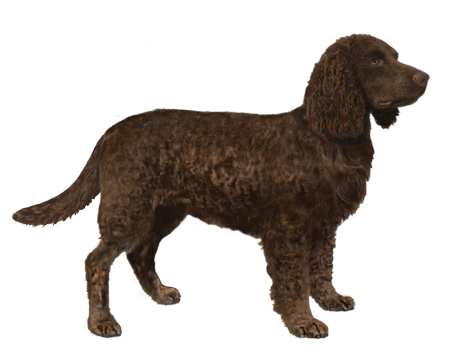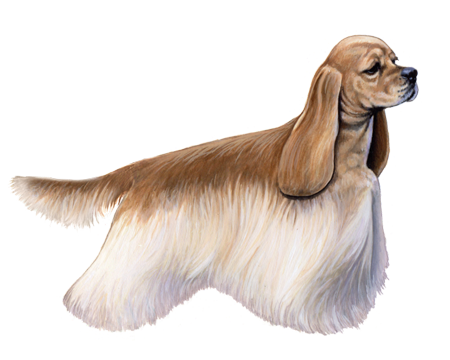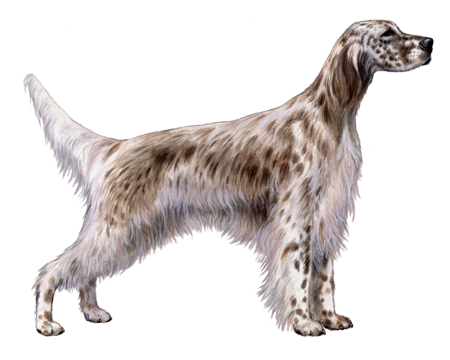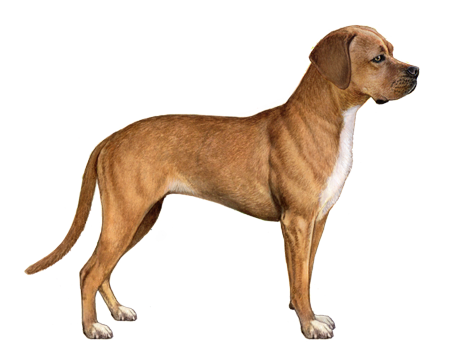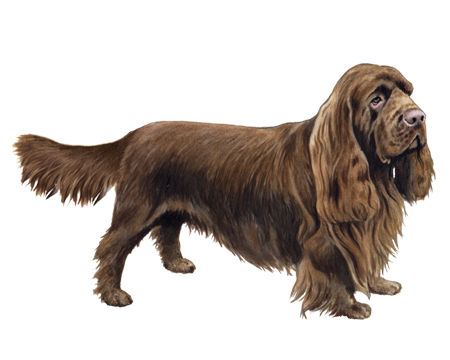
Portuguese Water Dog
The Portuguese Water Dog is an intelligent, hard-working, and energetic breed. Friendly and enthusiastic, these curly-coated cuties are equally skilled at working, playing, and lounging at home with the family.
Interested in discovering if your dog is a Portuguese Water Dog?
Check out Wisdom Panel's DNA tests.

Portuguese Water Dog Traits
General Appearance
The Portuguese Water Dog embodies strength, spirit, and soundness. Capable of working a full day in or out of the water, Porties are powerful and ruggedly built.
Coat and Coloring
The Portuguese Water Dog has a thick, water-repellent coat that is either curly or wavy. The coat may be white, black, or various shades of brown. A white chest blaze, white markings, and black markings are also possible. Porties frequently sport either a lion clip or retriever clip.
Distinctive Physical Traits
Portuguese Water Dogs have large, well-proportioned heads and a steady, attentive expression. They have webbed feet and a rudder-like tail that help with swimming and diving.
Portuguese Water Dog Temperament
Portuguese Water Dogs make excellent pets for families and active individuals. They're loyal to their people and excellent with kids—though they can be exuberant. So, adult supervision is a good idea when young children are around. They're also friendly toward other pets and dogs.
A very playful breed—especially around water—Porties need plenty of attention to be happy. But they reward their people with complete and utter devotion.
Portuguese Water Dogs may be nervous or shy around people they don't know. The best way to help them become comfortable in a variety of situations is to socialize them early in life.


Portuguese Water Dog History
The earliest written record we have of the Portuguese Water Dog is from 1297. In it, a monk recounts the story of a dog resembling the Portuguese Water Dog rescuing a drowning sailor.
Flash forward to 16th-century Portugal, where Portuguese Water Dogs—or "Porties" to fans of the breed—served as fishermen's assistants. Excellent swimmers, Porties often delivered messages between boats, herded fish into nets, pulled in nets, and guarded boats. Consistent with the monk's story from centuries before, they also saved fishermen who fell into the water.
During the 1800s—when commercial fishing equipment reduced the need for Portuguese Water Dogs—the breed faced extinction. But in the 1930s, a Portuguese businessman named Vasco Bensaude took an interest in the dogs and worked to save the breed.
The first pair of Porties found their way to the United States in 1958, and the breed's numbers have rebounded very well. The Portuguese Water Dog began competing in AKC shows in 1984.
Portuguese Water Dog Care
Nutrition
Portuguese Water Dogs require a high-quality dog food that is age-appropriate—whether it's commercially manufactured or homemade (with a veterinarian's supervision and approval).
All dogs are at risk for obesity if they eat too many calories. Monitor how much your Portuguese Water Dog eats. And avoid accidental overfeeding by measuring out meals. Also, be sure to include calories from treats when calculating their daily intake. As a general guideline, treats should make up no more than 10% of a dog's calories.
Grooming
The Portuguese Water Dog has hair instead of fur. That means—unlike fur coats that grow to a point and then shed—a Portie's hair keeps growing and occasionally falls out, similar to human hair. But it usually falls back into the coat (instead of all over the house). Because of this minimal shedding, Portuguese Water Dogs can be an excellent breed for people with allergies.
Though Porties don't shed a lot, their coats still need regular grooming. To keep their hair free from mats and tangles, brush your Portie regularly. And because the breed's hair grows continuously, they'll need haircuts every month or so.
Your Portuguese Water Dog's nails will wear down through regular activity. But you should still inspect them routinely for splits or cracks and trim them as needed. Overgrown nails can be painful and could eventually lead to issues walking or running.
Finally, maintaining good dental hygiene is essential for the overall long-term health of all dogs, regardless of breed. In addition to scheduling professional dental cleanings, aim to establish an at-home routine that includes regular teeth brushing.
Exercise
Portuguese Water Dogs are energetic, athletic dogs that need daily exercise to burn off extra energy. They excel at dog sports—such as agility, tracking, and obedience. Porties also enjoy musical freestyle, which is a mix of obedience training, dance, and tricks.
Because of their endurance, Porties make good jogging companions. And their exceptional swimming skills and love of water mean they're always up for dock diving, water trials, and fetching floating tennis balls.
Training
Portuguese Water Dogs often have a sensitive nature. So, they respond best to reward-based training using their favorite treats or toys.
Some Porties can be independent thinkers and may try to challenge their owners. Gentle, consistent training and plenty of exercise are the best tools to curb these independent streaks.

Portuguese Water Dog Genetic Health Conditions
-
Chondrodystrophy (CDDY) and Intervertebral Disc Disease (IVDD) Risk
Chondrodystrophy (CDDY) is a skeletal disorder characterized by shortened limbs and abnormal early degeneration of the spinal discs, or intervertebral disc disease (IVDD), which predisposes to disc herniation.
-
Early-Onset Progressive Retinal Atrophy (Discovered in the Portuguese Water Dog)
Progressive retinal atrophy (PRA) is a disorder where the light sensing retina at the back of the eye degenerates resulting in vision loss.
-
GM1 Gangliosidosis (Discovered in the Portuguese Water Dog)
GM1 gangliosidosis is a disorder of progressive nervous system degeneration, resulting in vision impairment, head tremor, involuntary eye movements, limb weakness with difficulties in balancing and fatigue.
Knowing if your Portuguese Water Dog is a carrier or at-risk for these conditions can help you and your veterinarian plan for your pup’s lifelong care. With Wisdom Panel™ Premium, you can get results for over 200 genetic health tests.
Breed Group
Sporting
The sporting group breeds are incredibly diverse in personality and appearance, but can be characterized as very sturdy. They were developed to work closely with people and in general have a very responsive nature and high intelligence.




